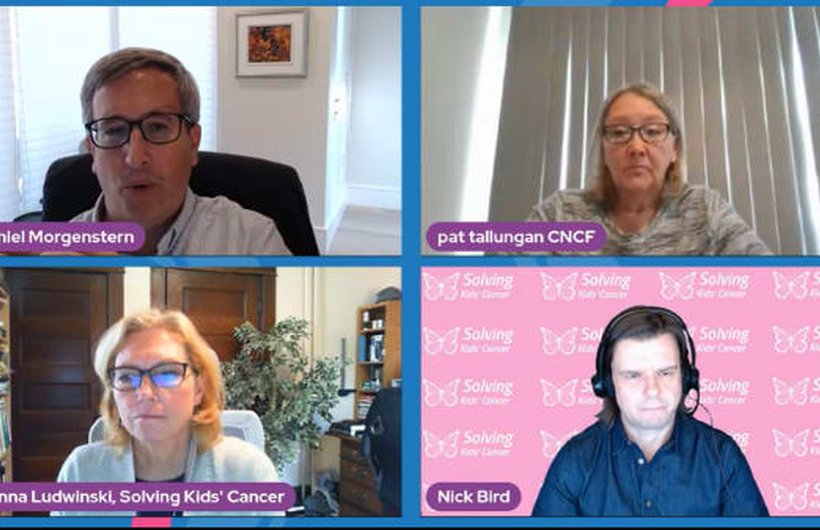Neuroblastoma Parent Global Symposium 2021 - A round-up
At the beginning of November, we hosted the second virtual Neuroblastoma Parent Global Symposium with Solving Kids’ Cancer US and Children’s Neuroblastoma Cancer Foundation. Across two days we welcomed over 500 participants from 45 countries to a range of talks and discussion sessions by leaders in the neuroblastoma field.
We were thrilled to see so many people from our community, including parents, family members, survivors, researchers, clinicians and healthcare professionals come together to learn and share with one another. Being able to once again do this on a global scale thanks to the virtual setting, generously provided by GRC World Forums, has allowed us to reach further and provide more people with this unique opportunity.
All of the sessions are still available to watch anytime on-demand here. With such a packed schedule and so many informative sessions on offer, here’s a roundup of what happened live at #NPGS2021...
Talks from Australia’s Family Conference
To kick off NPGS 2021, we hosted talks from Neuroblastoma Australia’s Family Conference, by Prof David Ziegler and Prof Murray Norris.
In Prof Ziegler’s talk on personalised medicine, we heard about the ongoing PRISM study, which hopes to build a model for treatment that is targeted to an individual’s disease, particularly where they have a number of unfavourable biological factors.
Prof Murray Norris shared an exciting update on a potential new target for neuroblastoma treatment- RUNX1T1. This is a ‘master switch’ in regulating other genes, which seems to have an important role in neuroblastoma tumour development. Researchers believe that a group of compounds called protein degraders could target this gene to inhibit tumour development- with preclinical research already underway to work out the mechanism to make this possible.
An overview of treatments
With neuroblastoma being such a complex disease with massive variation from case-to-case, there are many treatment pathways and options to be considered by families and their clinicians. In various sessions over the weekend, some of the most common therapies were explained as well as updates on more recently developed options.
In the Coping with Diagnosis session, Dr Ramya Ramanujachar, Dr Daniel Morgenstern, Dr Julie Park and Nurse Practitioner, Jennifer Saggio, explained the basics of the disease and the standard treatment pathway for high-risk neuroblastoma.
On the topic of more complex cases, we heard from Dr John Maris on his work in overcoming refractory neuroblastoma, and were introduced to the latest developments in using combination immunotherapy for relapse and refractory disease by Dr Robbie Majzner.
With the risk of relapse being so high, families often turn to clinical trials that may help to avoid this. In the session, Maintenance Therapies, we heard from Dr Shakeel Modak and Dr Giselle Scholler on the options that are currently available to children after they have reached no evidence of disease. Dr Lucas Moreno also covered options for relapsed neuroblastoma after achieving a response or stabilisation of disease.
Wider issues in the landscape
Research into neuroblastoma is still developing and growing, and there is still much to be done to have a better understanding of the disease and to stop its devastating impact. This means that there are still uncertainties in various areas, some of which are debated even between leaders in the field.
In Saturday’s featured talk, Dr Daniel Morgenstern and Nick Bird presented the debate around the use of high-dose chemotherapy in standard treatment. Dr Morgenstern shared data from the clinical community, explaining the differences in the use of high-dose chemotherapy in Europe and the US, and how we might move forward to change this. Nick Bird gave a poignant parent perspective on the issue, sharing words and experiences of the parent community on this very difficult stage of treatment.
A message of hope
As any neuroblastoma family knows, it is not easy to take in the vast amounts of information that is the landscape of this disease. It is even more difficult given the worrying statistics and outcomes that often come alongside this. Author and childhood cancer advocate, Lara Cady Weberling, captured this in her moving talk on hope. Sharing the story of her son Hans, who lost his battle to neuroblastoma aged nine, Lara spoke of the importance of hope and strength in her family’s journey, and how it allowed them to keep going through the darkest of times.
As a close to this year’s sessions, Pat Tallungan hosted the session on Survivorship, where we were joined by neuroblastoma survivors Jay, Johnny and Julia, who shared their experiences as a child going through treatment, and their inspirational stories of growing into the successful adults they are today.
To catch-up on any of the sessions from the Neuroblastoma Parent Global Symposium 2021, visit our YouTube channel or the event platform.





